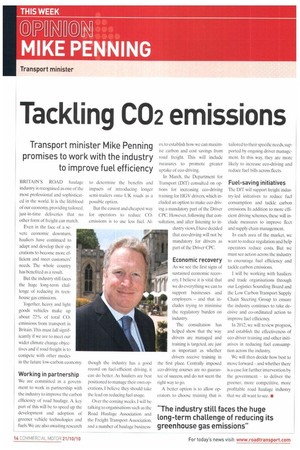Tackling CO2 emissions
Page 14

If you've noticed an error in this article please click here to report it so we can fix it.
Transport minister Mike Penning promises to work with the industry to improve fuel efficiency
BRITAIN'S ROAD haulage industry is recognised as one of the most professional and sophisticated in the world. It is the lifeblood of our economy, providing tailored, just-in-time deliveries that no other form of freight can match.
Even in the face of a severe economic downturn, hauliers have continued to adapt and develop their operations to become more efficient and meet customers' needs. The whole country has benefited as a result.
But the industry still faces the huge long-term challenge of reducing its reenhouse gas emissions.
Together. heavy and light goods vehicles make up about 22% of total CO2 emissions from transport in Britain. This must fall significantly if we are to meet our wider climate change objectives and if road freight is to compete with other modes in the future low-carbon economy Working in partnership We are committed as a government to work in partnership with the industry to improve the carbon efficiency of road haulage. A key part of this will be to speed up the development and adoption of greener vehicle technologies and fuels We are also awaiting research to determine the benefits and impacts of introducing longer semi-trailers onto UK roads as a possible option.
But the easiest and cheapest way for operators to reduce CO2 emissions is to use less fuel. Al though the industry has a good record on fuel-efficient driving, it can do better. As hauliers are best positioned to manage their own operations. I believe they should take the lead on reducing fuel usage.
Over the coming weeks, I will he talking to organisations such as the Road Haulage Association and the Freight Transport Association, and a number of haulage business es, to establish how we can maximise carbon and cost savings from road freight. This will include measures to promote greater uptake of cco-driving.
In March, the Department for Transport (DR') consulted on options for increasing eco-driving training for HGV drivers, which included an option to make eco driving a mandatory part of the Driver CPC. However, following that consultation, and after listening to industry views, I have decided that eco-driving will not be mandatory for drivers as part of the Driver CPC.
Economic recovery As we see the lint signs of sustained economic recovery I believe it is vital that we do everything we can to support businesses and employers — and that includes trying to minimise the regulatory burden on indu.stry.
The consultation has helped show that the way drivers arc managed and training is targeted, are just as important as whether drivers receive training in the first place. Centrally imposed eco-driving courses are no guarantee of success, and do not seem the right way to go.
A better option is to allow operators to choose training that is tailored to their specific needs, supported by ongoing driver management. In this way, they are more likely to increase eco-driving and reduce fuel bills across fleets.
Fuel-saving initiatives The DtT will support freight industry-led initiatives to reduce fuel consumption and tackle carbon emissions. In addition to more efficient driving schemes, these will include measures to improve fleet and supply chain management.
In each area of the market, we want to reduce regulation and help operators reduce costs. But we must see action across the industry to encourage fuel efficiency and tackle carbon emissions.
I will be working with hauliers and trade organisations through our Logistics Sounding Board and the Low Carbon Transport Supply Chain Steering Group to ensure the industry continues to take decisive and co-ordinated action to improve fuel efficiency.
In 2011 we will review progress, and establish the effectiveness of eco-driver training and other initiatives in reducing fuel consumption across the industry.
We will then decide how best to move forward — and whether there is a case for further intervention by the government — to deliver the greener, more competitive, more profitable road haulage industry that we all want to see. •




























































































































